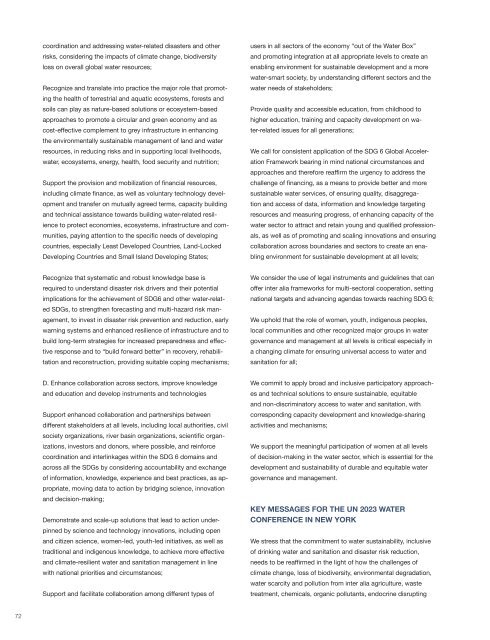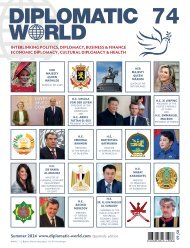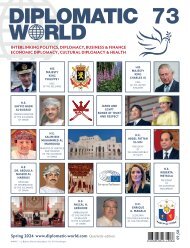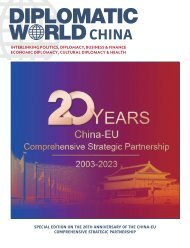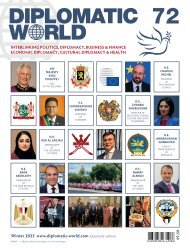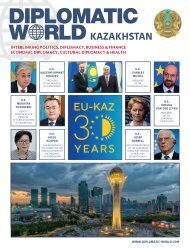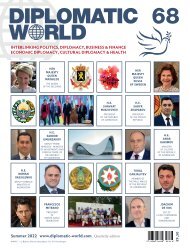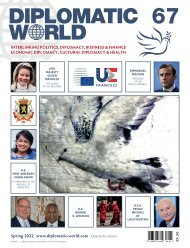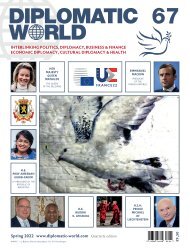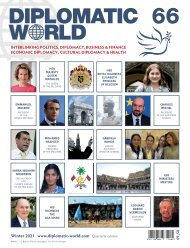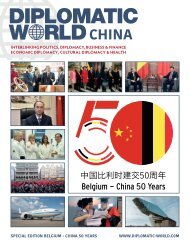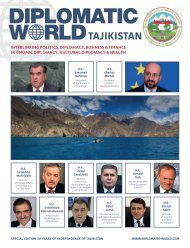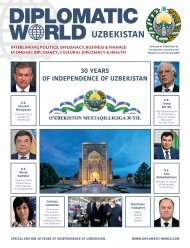Diplomatic World_69
Create successful ePaper yourself
Turn your PDF publications into a flip-book with our unique Google optimized e-Paper software.
coordination and addressing water-related disasters and other<br />
users in all sectors of the economy “out of the Water Box”<br />
chemicals, heavy metals and microplastics impact the lives and<br />
We note with appreciation the initiative of the Water and Climate<br />
risks, considering the impacts of climate change, biodiversity<br />
and promoting integration at all appropriate levels to create an<br />
prosperity of countless people every day and threaten the effec-<br />
Coalition’s Leaders to establish a set of global water and climate<br />
loss on overall global water resources;<br />
enabling environment for sustainable development and a more<br />
tive enjoyment of the above-mentioned human rights and the<br />
information services;<br />
water-smart society, by understanding different sectors and the<br />
vital needs of future generations;<br />
Recognize and translate into practice the major role that promot-<br />
water needs of stakeholders;<br />
We encourage the use of adequate monitoring tools for SDG<br />
ing the health of terrestrial and aquatic ecosystems, forests and<br />
We recall that, to achieve SDG 6 and the other water-related<br />
implementation, including all water-related targets, and the<br />
soils can play as nature-based solutions or ecosystem-based<br />
Provide quality and accessible education, from childhood to<br />
SDGs by 2030, accelerated action is needed by all countries and<br />
UN-Water Integrated Monitoring Initiative and Capacity Develop-<br />
approaches to promote a circular and green economy and as<br />
higher education, training and capacity development on wa-<br />
stakeholders, particularly in countries that are currently not “on<br />
ment Initiative for SDG 6;<br />
cost-effective complement to grey infrastructure in enhancing<br />
ter-related issues for all generations;<br />
track”, through financial and technological assistance, policy<br />
the environmentally sustainable management of land and water<br />
reforms and prioritization of adequate additional international<br />
We acknowledge the need to address gaps in gender data and<br />
resources, in reducing risks and in supporting local livelihoods,<br />
We call for consistent application of the SDG 6 Global Acceler-<br />
support for developing countries. The UN 2023 Water Confer-<br />
agree to strengthen reporting on sex-disaggregated data in<br />
water, ecosystems, energy, health, food security and nutrition;<br />
ation Framework bearing in mind national circumstances and<br />
ence should provide impetus, as well as institutional and financial<br />
the water domain and to strive to make this data available and<br />
approaches and therefore reaffirm the urgency to address the<br />
support, for countries to face this challenge together;<br />
accessible to all for evidence-based decision-making to promote<br />
Support the provision and mobilization of financial resources,<br />
challenge of financing, as a means to provide better and more<br />
gender equality in water-related domains and we note favora-<br />
including climate finance, as well as voluntary technology devel-<br />
sustainable water services, of ensuring quality, disaggrega-<br />
We commit to accelerating our efforts for coherent implemen-<br />
bly the multi-stakeholder “Call for Action to Accelerate Gender<br />
opment and transfer on mutually agreed terms, capacity building<br />
tion and access of data, information and knowledge targeting<br />
tation of water-related goals and achievement of targets of the<br />
Equality in the Water Domain”;<br />
and technical assistance towards building water-related resil-<br />
resources and measuring progress, of enhancing capacity of the<br />
2030 Agenda and aim at strengthening political and technical<br />
ience to protect economies, ecosystems, infrastructure and com-<br />
water sector to attract and retain young and qualified profession-<br />
dialogue on water, including at the highest level, as appropriate,<br />
We support and encourage the participation of young people to<br />
munities, paying attention to the specific needs of developing<br />
als, as well as of promoting and scaling innovations and ensuring<br />
in the context of the United Nations, and to improve the United<br />
play an important role in the UN 2023 Water Conference and fur-<br />
countries, especially Least Developed Countries, Land-Locked<br />
collaboration across boundaries and sectors to create an ena-<br />
Nations system-wide approach to water, enhancing the participa-<br />
ther note with interest the development of a “Water and Climate<br />
Developing Countries and Small Island Developing States;<br />
bling environment for sustainable development at all levels;<br />
tion of Member States;<br />
Youth Development Plan Agenda”;<br />
Recognize that systematic and robust knowledge base is<br />
We consider the use of legal instruments and guidelines that can<br />
We emphasize the need to strengthen water-related trans-bound-<br />
We support Tajikistan’s initiative on declaring an International<br />
required to understand disaster risk drivers and their potential<br />
offer inter alia frameworks for multi-sectoral cooperation, setting<br />
ary and regional cooperation, inter alia to build resilience to<br />
Year of Glaciers Preservation in 2025 and note with appreciation<br />
implications for the achievement of SDG6 and other water-relat-<br />
national targets and advancing agendas towards reaching SDG 6;<br />
water-related disasters, climate change, promote the sustainable,<br />
the intention to strengthen international mechanisms to facilitate<br />
ed SDGs, to strengthen forecasting and multi-hazard risk man-<br />
equitable, transparent and sound management of water, making<br />
access to accurate and timely information on the cryosphere;<br />
agement, to invest in disaster risk prevention and reduction, early<br />
We uphold that the role of women, youth, indigenous peoples,<br />
use also of relevant regional organizations, mechanisms, regional<br />
We envision the development of a Water Action Agenda mecha-<br />
warning systems and enhanced resilience of infrastructure and to<br />
local communities and other recognized major groups in water<br />
agreements and arrangements, such as river basin organizations,<br />
nism as an outcome of the UN 2023 Water Conference, build-<br />
build long-term strategies for increased preparedness and effec-<br />
governance and management at all levels is critical especially in<br />
as appropriate;<br />
ing on existing mechanisms, that brings together all voluntary<br />
tive response and to “build forward better” in recovery, rehabili-<br />
a changing climate for ensuring universal access to water and<br />
commitments – small and big, from Member States, stakeholders<br />
tation and reconstruction, providing suitable coping mechanisms;<br />
sanitation for all;<br />
We reiterate the need for strong, coherent and explicit integration<br />
and coalitions across the world from within and beyond the water<br />
and prioritization of water into national economic policies and<br />
sector – that accelerate and scale water actions across the 2030<br />
D. Enhance collaboration across sectors, improve knowledge<br />
We commit to apply broad and inclusive participatory approach-<br />
investment programs to raise awareness of why and how water<br />
Agenda and support, track and deliver on the 2030 Agenda and<br />
and education and develop instruments and technologies<br />
es and technical solutions to ensure sustainable, equitable<br />
and sanitation are necessary for achieving national development<br />
beyond 2030;<br />
and non-discriminatory access to water and sanitation, with<br />
objectives at all levels, such as through the voluntary develop-<br />
Support enhanced collaboration and partnerships between<br />
corresponding capacity development and knowledge-sharing<br />
ment by 2025 and strengthening of National Water Roadmaps or<br />
We recommend registering the actions and partnerships pro-<br />
different stakeholders at all levels, including local authorities, civil<br />
activities and mechanisms;<br />
strategies to accelerate the implementation of the 2030 Agenda<br />
posed during the Dushanbe Water Action Decade Conferences,<br />
society organizations, river basin organizations, scientific organ-<br />
and all water-related SDGs, as well as the need to implement<br />
as well as during all other relevant conferences and events, as<br />
izations, investors and donors, where possible, and reinforce<br />
We support the meaningful participation of women at all levels<br />
IWRM, including for non-conventional water resources, by means<br />
voluntary commitments on the UN Partnership Platform, and<br />
coordination and interlinkages within the SDG 6 domains and<br />
of decision-making in the water sector, which is essential for the<br />
of robust institutions, financing, policies and regulations, also for<br />
providing updates on their progress;<br />
across all the SDGs by considering accountability and exchange<br />
development and sustainability of durable and equitable water<br />
utilities and service providers;<br />
of information, knowledge, experience and best practices, as ap-<br />
governance and management.<br />
We express our sincere appreciation for the hospitality extended<br />
propriate, moving data to action by bridging science, innovation<br />
We emphasize the need to pre-invest in critical enablers, such<br />
by the Government and People of Tajikistan and the support of<br />
and decision-making;<br />
Demonstrate and scale-up solutions that lead to action underpinned<br />
by science and technology innovations, including open<br />
KEY MESSAGES FOR THE UN 2023 WATER<br />
CONFERENCE IN NEW YORK<br />
as education, science, knowledge, innovation and data on water<br />
quantity, quality, access, availability, risk drivers and use patterns,<br />
as well as other evidence-based approaches, for informed<br />
decision-making and improved planning capacity;<br />
the United Nations and of all the partners who contributed to this<br />
important conference.<br />
and citizen science, women-led, youth-led initiatives, as well as<br />
We stress that the commitment to water sustainability, inclusive<br />
traditional and indigenous knowledge, to achieve more effective<br />
of drinking water and sanitation and disaster risk reduction,<br />
We advocate for planning and implementation needs to be<br />
and climate-resilient water and sanitation management in line<br />
needs to be reaffirmed in the light of how the challenges of<br />
supported by financial resources and for the development of rev-<br />
with national priorities and circumstances;<br />
climate change, loss of biodiversity, environmental degradation,<br />
enue-raising mechanisms for water management, services, data<br />
water scarcity and pollution from inter alia agriculture, waste<br />
and knowledge development and prioritizing those most affected<br />
Support and facilitate collaboration among different types of<br />
treatment, chemicals, organic pollutants, endocrine disrupting<br />
by water-related challenges;<br />
72 73


